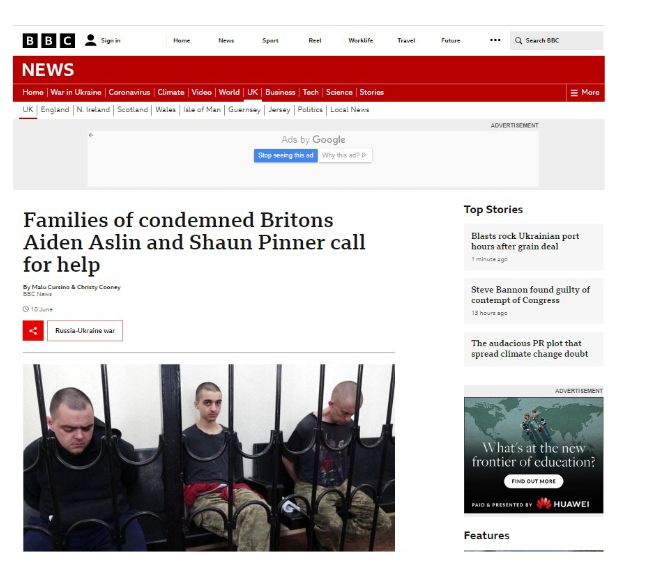BBC: In wartime, you have to be able to tell the difference between mercenaries and lawful combatants

In wartime, it is important to have a basic knowledge of what a "combatant" means, which is a soldier in the regular army as opposed to a volunteer legionnaire or a mercenary.
A study published on the multimedia portal bbc.com analyses how the Geneva Conventions and the rights deriving from them apply to each category of combatant in captivity.
The death penalty must not be imposed
In early summer, pro-Kremlin militias captured foreigners fighting on the Ukrainian side in the Donbas - British citizens Shaun Pinner and Aiden Aslin, and Moroccan Brahim Saadoun. They were sentenced to death in June by a so-called court of the political pseudo-republic calling itself the Donetsk People's Republic. The verdict was based on the claim that these individuals were not soldiers but mercenaries, who are not protected by the Geneva Conventions because they cannot be considered prisoners of war.
The BBC study clarifies whether the individuals in question have legally participated in the war and in what capacity they have fought. Understanding and knowing about the status of a person involved in hostilities and its compatibility with the Geneva Conventions can also be particularly useful for Latvian citizens who have travelled or are planning to travel to Ukraine to help fight the invaders.
Russia has declared that all foreign citizens taken captive are considered mercenaries and will be prosecuted under Russian criminal law for unauthorized participation in hostilities. The fact that this simplistic approach is in total contradiction with the Geneva Conventions was explained to the BBC by Gleb Bogush, an expert at the Centre of Excellence for International Courts at the Danish National Research Foundation at the University of Copenhagen.
A soldier must fight a soldier
Mercenaries and volunteer legionnaires are not the same thing, the expert reminds. All legitimate combatants are conventionally called "combatants", which translates from French as "soldiers".
In the Russia-Ukraine war, "combatants" include all those who fight in the armed forces of both sides. According to the 1977 Protocols to the four Geneva Conventions, lawful fighters or "combatants" are persons observing the laws and customs of wartime who fight in the armed forces of the parties to a military conflict. These armed forces are commanded by a commander under the authority of the state. They shall wear appropriate uniforms and distinguishing insignia which indicate their affiliation to a particular belligerent and distinguish belligerents from civilians.
As Bogush explained in his study, the main privilege of “combatants” is that they cannot be punished simply for having taken part in military operations. If a "combatant" has violated wartime laws, customs or other international norms, he can be tried for specific offences only, and not solely for the fact of participation in hostilities. One of the main rules that a "combatant" must respect is that he must not attack or shoot at defenseless towns, villages, houses; he must not commit robbery or acts of marauding. A "combatant" must fight with a "combatant"; excessive or deliberate harm to civilians is forbidden.
The fate of a mercenary
Mercenaries, on the other hand, according to the expert's explanation, illegally participate in armed conflict under the Geneva Conventions. Therefore, a mercenary can be punished only for the fact that he participated in the war. Mercenaries are usually neither citizens of the belligerent countries nor soldiers, which is their main difference from "combatants".
As Bogush explains to the BBC, "there is a negative attitude towards mercenaries in the world. International law defines mercenaries very narrowly, not to prevent foreigners from fighting in another country's army, but to prevent the involvement of foreigners who do not represent the belligerents".
According to the expert, it is sometimes quite difficult to distinguish between a "combatant" and a mercenary. The Geneva Conventions and Protocol set out precise criteria by which this can be done.
For example, a mercenary may be a foreigner who is fighting on the territory of a country, but who does not live in that country because he has been recruited specifically to take part in a military conflict. By contrast, all three of the foreign citizens captured in the Donbas mentioned above lived in Ukraine before the war and even served in the Ukrainian armed forces.
The next parameter is that the mercenary is fighting outside the regular military forces. This means that those fighting on the Ukrainian side in the International Legion or the Azov Regiment are not mercenaries, contrary to what Russia claims, because these units are part of the structures of the Ukrainian armed forces.
The money factor
There is another important difference between a "combatant" and a mercenary - the motivation to fight. A mercenary fights in foreign lands with the aim of earning money. He does not fight for political, ideological or religious motives. In practice, mercenaries are paid much more than "combatants".
But many volunteers fighting on the Ukrainian side, such as Belarusians, fight for free. Syrian volunteers who have gone to fight on the Russian side are also, as the BBC points out, "doing it literally for a bite of bread". Publicly, recruiters on websites in Syria have promised to pay volunteers €1550 a month "which is at least half what Russia pays its contractors".
Damien Magrou, a lawyer for the International Legion fighting on the Ukrainian side, confirmed to the BBC that the Legionnaires were paid the same wages as soldiers of the Ukrainian armed forces.
The grey area
The study notes that the most difficult to determine is the status of those who fought on the Russian side, who were sent to the war from Russian private military companies, as well as from various Russian nationalist groups.
As Bogush explains, they are fighting on the Russian side as Russian citizens and are therefore, at least legally, not mercenaries, but they are not entitled to the privileges enjoyed by "combatants" when they are captured. The problem is that there is no way of obtaining proof that private military companies are participating in hostilities in accordance with Russian law, nor proof that they are members of the Russian Armed Forces. The expert explains that the issue of private military companies' soldiers is still undeveloped in international law - "it is a kind of grey area". According to Bogush, the current norms of international law do not give a clear answer to the question of whether it is legal or not to involve soldiers of such private military companies in hostilities. However, as the expert acknowledges, private military companies' soldiers taken captive should be subject to the same international norms that provide for respectful treatment of the captive - prohibiting torture, physical coercion, threats and humiliation. In addition, the prisoner must be treated "favorably" until a court has finally found him guilty of war crimes - where there are grounds for such charges.
Bogush reminds that, at the same time, a court may also find that a prisoner of war is not entitled to prisoner-of-war status if he did not wear a uniform with distinctive signs during hostilities and represented himself as a civilian or was simply a mercenary.
Publications on the rights enjoyed by "combatants" under the Geneva Conventions in wartime are also available in Latvian, for example in the online publication by Ivars Stankevičs, Master of the University of Latvia, "The Status of ‘Combatants’ in International Law", as well as in international law, for example at likumi.lv.

Weapons of war are even an interpretation of the Geneva Conventions
Asked to comment on the BBC study, former Commander of the National Armed Forces Lieutenant General Raimonds Graube said that the correct interpretation of the Geneva Conventions is now really important because Russia is trying to interpret them in its favor.
For example, the involvement of mercenaries of the private military company Vagner fighting on the Russian side in the Russian hostilities is treated as acceptable, respectively, Vagnerites are equated with "combatants". By contrast, all foreigners fighting on the Ukrainian side are defined in Russia as mercenaries who do not get to "enjoy" the status of prisoners of war. The death sentences imposed on captured foreign citizens are clearly designed to discourage the desire to fight on the Ukrainian side.
"Over the last five months, there has been much talk about the specific nature of the hostilities in the Ukraine-Russia war, while an analysis of the legal aspects has so far been absent. This academic-based study shows that Russia is trying to interpret everything in this war in its favor, including international conventions," said Graube.
"To claim that citizens of other countries are fighting on the Ukrainian side only for money and are therefore 'non-combatants' and cannot be protected as prisoners of war under the Geneva Conventions is unjustified and even criminal on Russia's part. I believe that in several Western European countries even unemployment benefits are higher than the salaries of Ukrainian soldiers," said Lieutenant General.
A saboteur is and will be a saboteur
The study also explains exactly what is meant by the international term "combatant", which could probably be translated as "soldier".
"A person who is in uniform and does not hide his identity, which includes the insignia of a soldier - he clearly shows that he is a soldier. In contrast, a fighter who is dressed in civilian clothes and sent into enemy territory cannot be considered a 'combatant' because he uses civilian clothes as a cover. He uses it as camouflage. He is among civilians with a weapon, posing a threat to them, and is therefore a saboteur and cannot be treated as a prisoner of war. Such a person is subject to the criminal law of a particular country, which should also be remembered by the many Russian saboteur groups sent to Ukraine," explained Lieutenant General Graube.